CKBlog: The Market
Wednesday, October 02, 2024
2024 Presidential Election and Market Volatility
by Steve Haberstroh, Partner
The Presidential and Congressional Elections are nearly one month away. For those of us in the United States, it is difficult (impossible?) to tune out the noise, most of which suggests that the U.S. is in for a tumultuous period. It is no wonder many folks are asking questions like:
Should I sit in cash or “de-risk” my portfolio until the dust settles?
VP Harris and former President Trump could not be more different, should I change my investments based on who ultimately wins?
Which candidate will be better for the economy?
Let’s tackle each of these questions.
Should I sit in cash or “de-risk” my portfolio until the dust settles?
If, for instance, your portfolio is earmarked to buy a home in three months, then you should be in cash or money market funds already. If it is for retirement or another investment objective that is five or more years off, then the answer is “No, you shouldn’t.”
It makes intuitive sense to want to protect your portfolio by going to cash or significantly reducing your exposure to stocks leading up to an election. In fact, many market participants do just that.
Markets tend to get more volatile (larger swings) leading up to November then become less so post-election. See the following chart depicting the Volatility Index (VIX) also known as the “fear gauge” during the last eight Presidential Election cycles. A descending line indicates less expected risk in the market. Note that the “fear” sentiment (investor anxiety) spikes leading into an election (upward sloping trendline) then subsides once we know the outcome (downward sloping trendline).
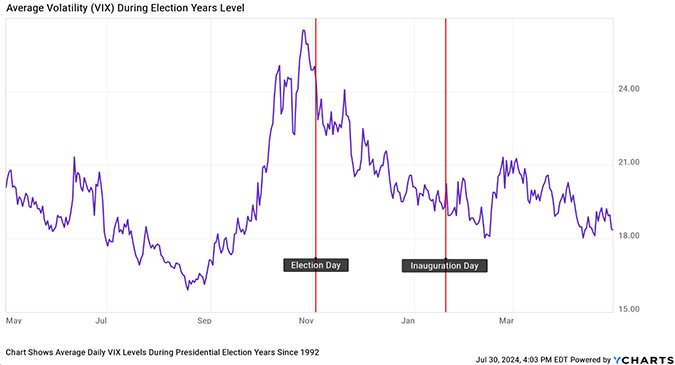
If this election plays out in a similar fashion, why not sell now and get back in after we know the results? First, if this is a taxable account, why incur the potential capital gains taxes if you intend to buy back in? Second, will you really feel comfortable enough to get back in after the election if markets sell-off and the environment is bleak? If you think media coverage is negative today, imagine the coverage in mid-November? Some headlines might be: “President Harris Set to Implement Socialist Policies and Crush the Economy” or “Trump Tariffs to Derail Economy.” We find that it is far easier for investors to sell out of a market then to buy back in.
What if the markets don’t sell-off leading up to the election? Will you be prepared to buy back in at higher prices than when you sold?
Nobody has the ability to time the market reliably. Though it may seem less exciting, staying the course over the long-term is a more profitable strategy (and a simpler one).
Don’t believe us? Do you think investors had reasons to sell when President Kennedy was faced with the Cuban missile crisis, or when he was later assassinated? Or perhaps when President Ford took over after Nixon was impeached? Or President Obama taking office during the Great Financial Crisis?
Take a look at the chart below. With the benefit of hindsight, would selling out at any of those points have been more profitable than remaining invested in stocks over the long haul (recognizing there have been periods of shorter-term drawdowns)?
In fact, since 1950, the worst outcome for the S&P 500 Index over a 20-year rolling period was a positive 6% annualized total return.
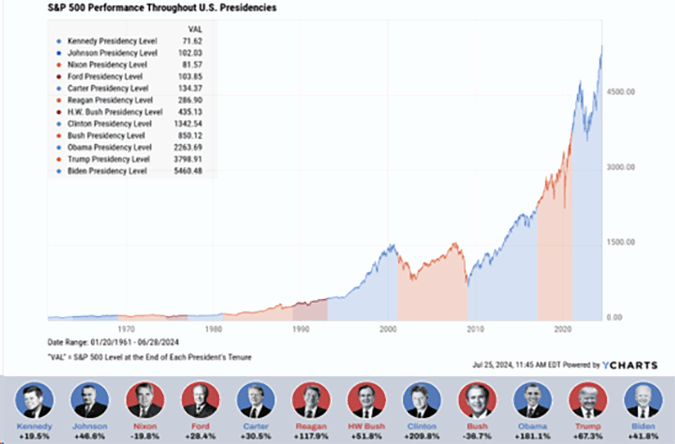
VP Harris and former President Trump could not be more different, should I change my investments based on who ultimately wins?
It is tempting to adjust your investment plan based on who might be in office. In some cases, this can make intuitive sense. If the President is supportive of a particular industry, it stands to reason that companies within that industry may fare better. The tricky part, however, is markets tend to price in those impacts very quickly. By the time the election results are published, and you have had the time to analyze the repercussions, the market “move” may have already taken place.
You may be right, but there is no guarantee you will make money.
A classic example involves the fossil fuel industry under President Biden. When then VP Biden was on the campaign trail in 2020, he held rallies against fossil fuel companies. A reasonable conclusion would be that during a Biden administration, oil companies’ equities would suffer due to increased regulation, negative coverage in the media and an increase in subsidies for “green” alternatives like solar power.
An investor might have chosen to sell out of oil stocks and buy into solar energy companies for instance. Turns out, that would have been a terrible trade ...
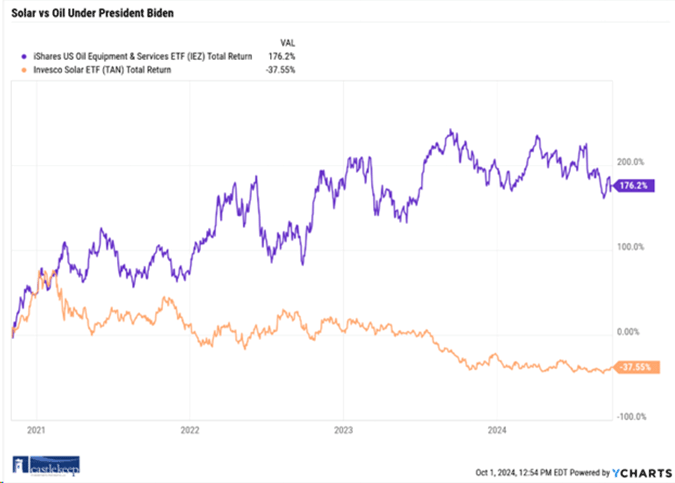
From Election Day in 2020 through September 30th, 2024, the iShares US Oil Equipment & Services ETF (ticker IEZ) had a total return of 176.2% while the Invesco Solar ETF (ticker TAN) lost 37.55%.
We wouldn’t recommend making drastic changes to your investment plan based on who makes it to the White House.
Which candidate will be better for the economy?
This is a difficult question as there are innumerable variables that can impact the economy over a four-year span. VP Harris may be viewed as less favorable toward business due to her proposals to raise the corporate tax rate, but she is also proposing large tax breaks for small business start-ups. Former President Trump is viewed by many as pro-business given his background, but he’s also seen as erratic and unpredictable—characteristics that CEOs and businesses find unattractive.
The truth is that while a President can influence the business environment, complete overhauls to regulation, legislation, and tax policy require Congressional approval. Presidents aren’t royalty. They can’t go at it alone.
Perhaps the best way to answer this question is to look at how the US Economy fared during both President Trump’s administration and President Biden’s administration with Harris as VP (to present). Reminder that Covid began spreading in early 2020.
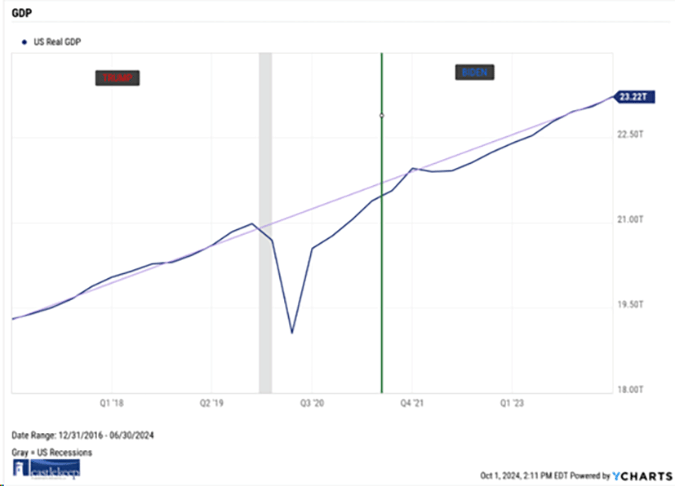
As you can see from the chart, despite all the rhetoric, real GDP growth remained on the same purple trendline (except for during the pandemic) during both administrations. So, what should you do?
In conclusion, resist the urge for wholesale change. Do not let your political views influence your investment decisions. Investing based on political affiliations does not produce attractive results.
Consider three hypothetical investors starting with $10,000 in 1950. The first investor (red) only holds the S&P 500 Index during Republican Presidencies. The second investor (blue) only holds the S&P 500 Index during Democratic Presidencies. The third investor (gray) remains invested regardless of who takes office.
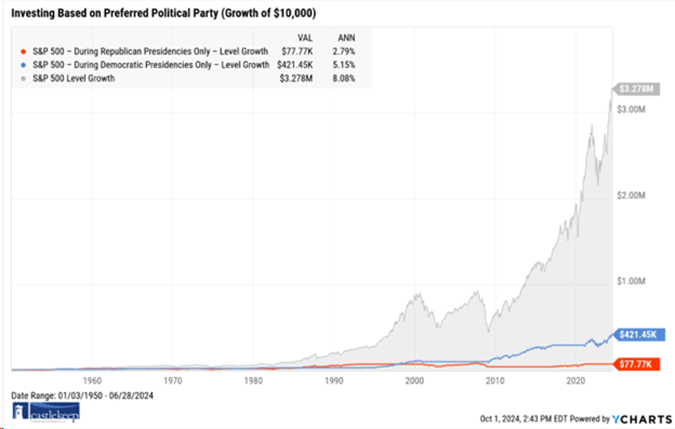
Which investor would you rather be?
We recommend you stay the course.
Sincerely,
Steve Haberstroh
Partner
On Behalf of the CastleKeep Team
PDF Version of 2024 Presidential Election & Market Volatility




